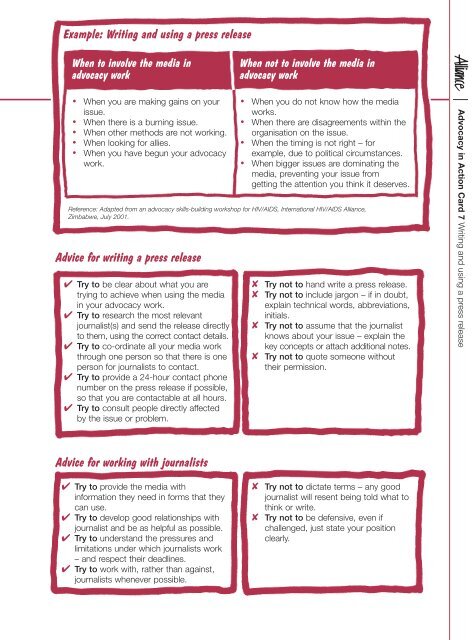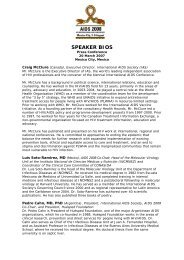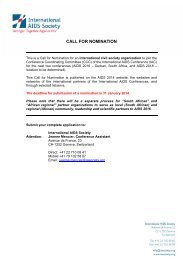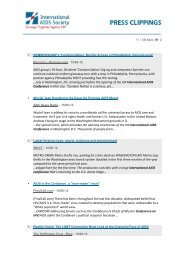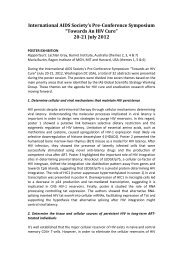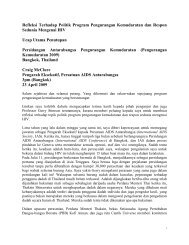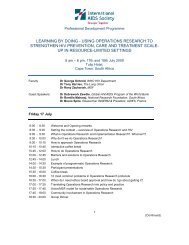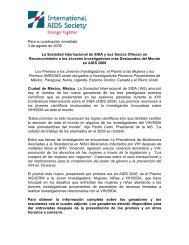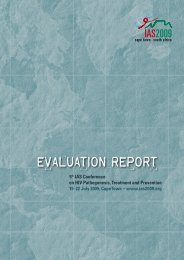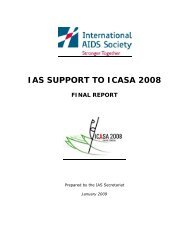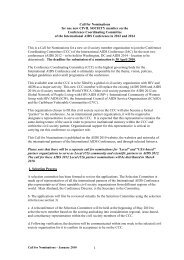Advocacy in Action - International AIDS Society
Advocacy in Action - International AIDS Society
Advocacy in Action - International AIDS Society
You also want an ePaper? Increase the reach of your titles
YUMPU automatically turns print PDFs into web optimized ePapers that Google loves.
Example: Writ<strong>in</strong>g and us<strong>in</strong>g a press release<br />
When to <strong>in</strong>volve the media <strong>in</strong><br />
advocacy work<br />
When not to <strong>in</strong>volve the media <strong>in</strong><br />
advocacy work<br />
• When you are mak<strong>in</strong>g ga<strong>in</strong>s on your<br />
issue.<br />
• When there is a burn<strong>in</strong>g issue.<br />
• When other methods are not work<strong>in</strong>g.<br />
• When look<strong>in</strong>g for allies.<br />
• When you have begun your advocacy<br />
work.<br />
Advice for writ<strong>in</strong>g a press release<br />
✔ Try to be clear about what you are<br />
try<strong>in</strong>g to achieve when us<strong>in</strong>g the media<br />
<strong>in</strong> your advocacy work.<br />
✔ Try to research the most relevant<br />
journalist(s) and send the release directly<br />
to them, us<strong>in</strong>g the correct contact details.<br />
✔ Try to co-ord<strong>in</strong>ate all your media work<br />
through one person so that there is one<br />
person for journalists to contact.<br />
✔ Try to provide a 24-hour contact phone<br />
number on the press release if possible,<br />
so that you are contactable at all hours.<br />
✔ Try to consult people directly affected<br />
by the issue or problem.<br />
• When you do not know how the media<br />
works.<br />
• When there are disagreements with<strong>in</strong> the<br />
organisation on the issue.<br />
• When the tim<strong>in</strong>g is not right – for<br />
example, due to political circumstances.<br />
• When bigger issues are dom<strong>in</strong>at<strong>in</strong>g the<br />
media, prevent<strong>in</strong>g your issue from<br />
gett<strong>in</strong>g the attention you th<strong>in</strong>k it deserves.<br />
Reference: Adapted from an advocacy skills-build<strong>in</strong>g workshop for HIV/<strong>AIDS</strong>, <strong>International</strong> HIV/<strong>AIDS</strong> Alliance,<br />
Zimbabwe, July 2001.<br />
✘ Try not to hand write a press release.<br />
✘ Try not to <strong>in</strong>clude jargon – if <strong>in</strong> doubt,<br />
expla<strong>in</strong> technical words, abbreviations,<br />
<strong>in</strong>itials.<br />
✘ Try not to assume that the journalist<br />
knows about your issue – expla<strong>in</strong> the<br />
key concepts or attach additional notes.<br />
✘ Try not to quote someone without<br />
their permission.<br />
<strong>Advocacy</strong> <strong>in</strong> <strong>Action</strong> Card 7 Writ<strong>in</strong>g and us<strong>in</strong>g a press release<br />
Advice for work<strong>in</strong>g with journalists<br />
✔ Try to provide the media with<br />
<strong>in</strong>formation they need <strong>in</strong> forms that they<br />
can use.<br />
✔ Try to develop good relationships with<br />
journalist and be as helpful as possible.<br />
✔ Try to understand the pressures and<br />
limitations under which journalists work<br />
– and respect their deadl<strong>in</strong>es.<br />
✔ Try to work with, rather than aga<strong>in</strong>st,<br />
journalists whenever possible.<br />
✘ Try not to dictate terms – any good<br />
journalist will resent be<strong>in</strong>g told what to<br />
th<strong>in</strong>k or write.<br />
✘ Try not to be defensive, even if<br />
challenged, just state your position<br />
clearly.


